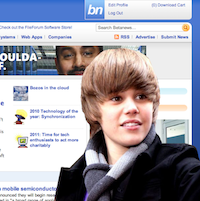
Bieber.ly will maime your shortened URL with teen's image
Surely today marks the end of Western civilization. The YouTube generation that spawned the Justin Bieber sensation has another place for the much-loathed (by adults - come on, you know you do) teen singer. Bieber now has a URL shortener, which does more than just shorten the URL. Bieber.ly also plasters a photo of the teen on whatever website it takes you to -- and every page you navigate to.
Normally I wouldn't post something like this, but surely somebody would want to comment about this marvel of brand marketing and ickiness. So I'm eager for some reader reaction to this one. Fire up your comments, folks.
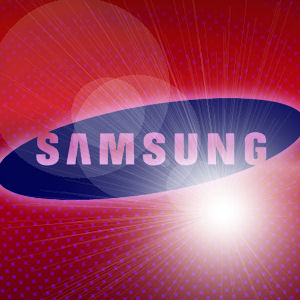
IBM & Samsung announce R&D for sub-20nm mobile semiconductors
Today, semiconductor manufacturers IBM and Samsung announced they will begin research and development on a new process technology that will be utilized in "a broad range of applications," in the general area of mobile telecommunications.
IBM, Samsung, and Global Foundries are partnered in what is known as the Common Platform technology alliance, where each company provides resources and expertise for the development of new bulk CMOS process technologies. IBM and Samsung have already established a joint development agreement to nodes starting at 20nm and beyond.

Microsoft releases WebMatrix, new Web development freeware
Thursday, Microsoft released its new free Web development software WebMatrix, a tool that lets users create, build and deploy websites based upon the web technologies and content management systems of their choosing. The goal of the software is to be an extremely simple, lightweight development environment that eliminates the need for switching back and forth between other applications while developing websites.
Sites can be built from templates or from scratch, and more than 40 open source web applications are supported, like the popular WordPress, Joomla, DotNetNuke, and more, and files can then be edited in HTML, CSS, ASP.NET or PHP. Naturally, Microsoft put some special shine on ASP.NET in WebMatrix and included support for the "Razor" view engine and special single-line-of-code helper functions to integrate with external social and commercial services.
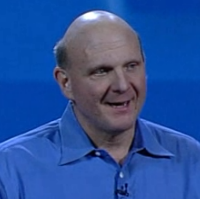
Steve Ballmer finally shows who's in charge of Microsoft
In his 11th year as chief executive and third outside the shadow of Chairman Bill Gates, Steve Ballmer is asserting surprising control over Microsoft. There were signs in 2010, but events over just the last week, particularly the public execution of Bob Muglia, show a different side of Microsoft's CEO. Competitors, you've been warned.
Over the last week, Ballmer did two things that spotlight this change in his leadership style, something already seen in other executive ousters (including Robbie Bach and Ray Ozzie in 2010). The first: Ballmer rightly resisted making tablets a major part of his Consumer Electronics Show keynote last week. The second: Muglia's demotion, and in real substance firing, as Server and Tools Business president.

It's official, iPad sapped Windows PC shipments during Q4 2010, but Macs more
Gartner and IDC both released fourth-quarter PC shipments this afternoon (PC here refers to Windows computers and Macs). While they didn't agree on the actual numbers or year-over-year growth, both analyst firms cited iPad and other media tablets (What? There are others?) as displacing PC sales. Well, hell, no wonder every Tom, Dick, Harry and Jane with a manufacturing plant, or the funds to outsource one, showed off a tablet during last week's Consumer Electronics Show.
A Betanews analysis finds that not only did iPad cannibalize computers sales but with greater impact on Apple than major Windows PC vendors.
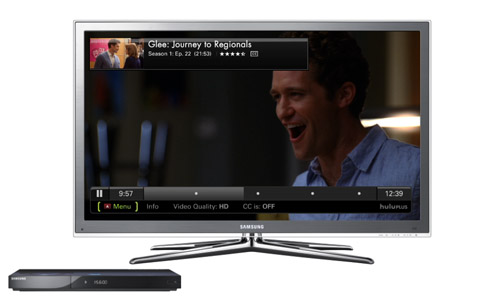
Grey Areas: Accessing Hulu for free in the age of Hulu Plus
Just two months ago, Hulu launched its premium subscription service Hulu Plus which brings streaming TV content from its popular website to mobile devices and connected TVs and set-top boxes.
Now that a special for-pay version of Hulu exists for all these devices, the services that brought Hulu's free Web content to these same devices could be squeezed out of the "placeshifting" margin where they existed before.

Sony sues Hotz, hacking group over PS3 hacks
Sony has filed suit against George Hotz -- more commonly known for his work in jailbreaking iPhones -- and a hacker group called "failoverfl0w," accusing both of copyright infringement and other related charges over their work to circumvent Sony's PlayStation 3 copyright protection.
The Japanese game maker is partially at fault here, having failed to use properly secure cryptography in order to ensure that pirated software can not run on the console. Hackers discovered the private key, and now can allow copied versions of games to run on the console without any issues.

Global IT spending will reach $3.6 trillion in 2011
Worldwide IT spending will rise by 5.1 percent this year to $3.6 tillion, according to Gartner. The new forecast increases year-over-year growth from 3.5 percent. The analyst firm released the data last week; some news is better kept on hold until supernovas like the Consumer Electronics Show or the Verizon iPhone pass by.
Richard Gordon, a Gartner research vice president, expressed cautious optimism. The forecast "is far from certain, given continued macroeconomic uncertainty," he said in a statement. "Favorable US dollar exchange rates" is one factor precipitating IT spending.

Who's switching from AT&T to Verizon iPhone? It's probably not you
The rabble worshipping Apple's so-called Jesus phone are in for a surprise. The expected mass-exodus from AT&T to Verizon may be more myth than reality. Yesterday I asked Betanews readers "Would you buy Verizon iPhone?" and embedded a poll in that story and two others. At least among the tech-savvy people who read Betanews, the informal survey suggests that most will not switch from iPhone 4 on AT&T to iPhone 4 on Verizon. Nor are they likely to abandon Android phones. Prominent blogger or journalist posts, particularly the prognosticators of Android's doom, give a different impression. It's reality check time, baby.
Betanews readers give many reasons for sticking with what they've got, and for many it's not iPhone. Reasons range from satisfaction with their existing (usually Android) handset to concerns iPhone 4 is already outdated to there being no LTE support.

Microsoft says Apple can't trademark 'app store,' files dispute
Microsoft is challenging Apple's 2008 trademark application for "app store," reports said on Wednesday. The term, Microsoft contests, should be non-trademarkable, because, in short, an App Store is a generic term for a store that sells apps, not a proper name.
"The undisputed facts further show that the combined term 'app store' is commonly used in the trade, by the general press, by consumers, by Apple's competitors, and even by Apple's founder and CEO Steve Jobs as a generic name for online stores featuring apps," Microsoft's complaint with the Trademark Trial and Appeal board says. "A search of Westlaw's US ALL NEWS database found over 1,000 current articles using 'app store' as the generic name for stores featuring apps."

Hands-on with Book Saver, iON's Book-to-eBook scanner
At the end of December, I looked at some of the book scanning options for small collections looking to archive their unique printed matter and make it accessible on digital platforms. Now, thanks to the availability of low-cost cameras and optical character recognition software, that sort of scanning is about to break into the mainstream.
iON, maker of every type of entry-level analog-to-digital conversion appliance, announced it will begin selling its own paper-to-eBook scanning solution this year called the Book Saver.

Still trying to shake off its past, MySpace lays off almost half of its staff
MySpace, the social network that defined social networking in the dawn of the 21st century, is undergoing another round of massive cutbacks which will terminate 47% of its employees, parent company News Corp announced Tuesday. The site has been trying to re-invent itself as a music and entertainment hub as Facebook, Twitter, Tumblr, and other social communication services pick away at its rapidly dwindling audience.
The last round of layoffs at MySpace that were this severe took place in 2009, when 30% of the staff was laid off to compensate for "the realities of today's marketplace."
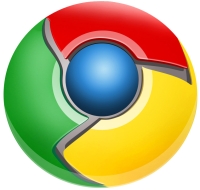
Google does an Apple in reverse -- will drop H.264 support in Chrome
Would someone please stop the "Twilight Zone" music from playing. I'm hearing it now following today's Google bombshell (Yes, there is other news besides Verizon iPhone): Chrome will soon no longer support the H.264 codec. Google supports Flash Video, but Apple has abandoned it. Apple supports H.264, and Google is giving it up. Someone pinch me when there is something resembling sanity among these companies' positions. Perhaps Firefox can save us all and our online video streaming. No, wait! Mozilla also spurns H.264. Well, gulp, Internet Explorer anyone?
Apple's Flash abandonment is nutty enough, at least in the here and now, given how widely Adobe's technology is used on the Web. H.264 also is pervasive, making Google's plan as out of touch, from a user experience perspective. Then there is Google's support for Flash to consider. Am I missing something or isn't H.264 a primary Flash codec?

First U.S. LTE plans could be bad news, say consumer groups
Advocacy groups Free Press, Media Access Project, and New America Foundation sent a complaint to the Federal Communications Commission Tuesday regarding the policies of MetroPCS, the nation's fifth-largest wireless operator, and the first one to activate its LTE 4G network. The groups complain MetroPCS' new "unlimited" wireless broadband service plans fall through loopholes in the FCC's new net neutrality plans, and could set a precedent for unfair content blocking.
Last week, MetroPCS unveiled new 4G LTE service plans which cost $40, $50, or $60 dollars. Each of the plans offers unlimited talk, text, and 4G Web browsing, but then the company puts up vague content barriers without defining what the usage cases are, and what consumers have access to.

Can you switch from AT&T to Verizon iPhone without paying hefty termination fees?
No, but you can act like you did. The iPhone's high resale value can cover early termination fees and possibly cost of a new handset from Verizon.
In December, I abandoned AT&T and iPhone 4, returning to T-Mobile with the Samsung-manufactured, Google-branded Nexus S. AT&T charges a $325 ETF for smartphones, which is prorated depending on number of months left on the contract. I signed up for new AT&T service is June, making my December ETF $275. That set the minimum price for which I would sell iPhone 4.